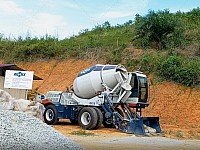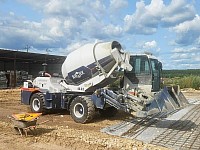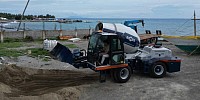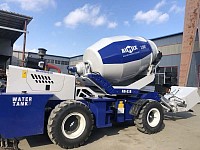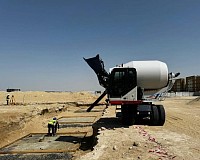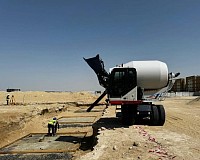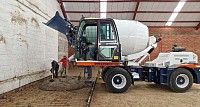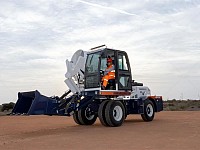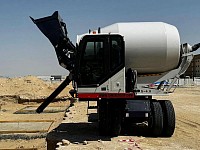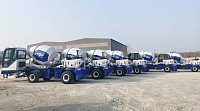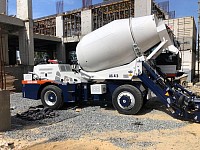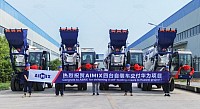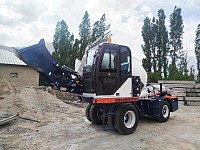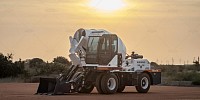share efficient concrete mixing solutions
The Impact of Drum Rotation Speed on Concrete Quality and Mixing Efficiency
Concrete mixers are vital in construction, and their drum rotation speed is crucial for quality and efficiency. Proper rotation speed ensures that concrete mixes uniformly, affecting the final product's durability and strength. Understanding this aspect helps operators optimize mixer performance and deliver superior concrete in various projects.
Understanding Drum Rotation Speed
Drum rotation speed directly influences how concrete components blend together. Faster speeds may lead to segregation, while slower speeds might result in incomplete mixing. Achieving the right balance is essential for maintaining concrete consistency. Operators must adjust speed based on the mix type and project requirements to ensure high-quality outcomes.
Benefits for Self Loading Concrete Mixers
Self loading mixer concrete benefits from adjustable rotation speeds. These mixers must mix and transport concrete efficiently. By optimizing rotation speed, operators can ensure the concrete remains uniform during transit. This feature enhances the reliability of self loading mixers, making them ideal for diverse construction tasks.
Optimizing Mobile Concrete Mixer Performance
Mobile concrete mixers require precise rotation speed control. As they move between sites, consistent concrete quality is crucial. Adjusting drum speed ensures that the mix stays homogeneous, regardless of location. This adaptability makes the mobile concrete mixer for sale suitable for various projects, enhancing their utility in construction.
Factors Affecting Drum Speed Decisions
Several factors influence the ideal drum rotation speed. Material type, mix consistency, and environmental conditions play significant roles. Operators must consider these elements when setting speed. Understanding these factors ensures that mixers produce high-quality concrete efficiently. It also reduces the risk of errors and enhances project outcomes.
Improving Mixing Efficiency
Drum rotation speed impacts mixing efficiency significantly. Proper speed reduces mixing time and enhances productivity. Efficient mixing leads to faster project completion and reduced labor costs. By optimizing speed, contractors can improve workflow and deliver projects on time. This efficiency is vital in competitive construction environments.
Conclusion
The impact of drum rotation speed on concrete quality and mixing efficiency is profound. Self loading and mobile mixers benefit from optimized speeds, enhancing their functionality. Factors like material type and environmental conditions influence speed choices. By understanding these aspects, operators can ensure superior concrete quality. Optimizing drum speed also improves mixing efficiency, boosting productivity and reducing costs. Prioritizing drum speed adjustments is essential for successful construction projects.
Choose Concrete Mixers for Marine Construction in Seaside
Marine construction projects face unique challenges, especially in seaside environments. Choosing the right concrete mixer is crucial for success. In this article, we explore the best options for marine construction, focusing on self loading and small concrete mixers. These insights aim to guide customers in making informed decisions for their projects.
Understanding Marine Construction Needs
Marine construction requires durable and reliable equipment. Concrete mixers must withstand harsh seaside conditions. Saltwater, humidity, and wind can affect equipment performance.
Self loading concrete mixers offer several advantages. They automate loading and mixing processes, reducing manual labor. Small concrete mixers provide flexibility and ease of transport. Both types are suitable for marine construction, but choosing the right one depends on project requirements.
Benefits of Self Loading Concrete Mixers
Self loading mixers combine several functions into one machine. They load, mix, and transport concrete efficiently. This self load concrete mixer for sale reduces the need for multiple machines and lowers operational costs.
In seaside projects, self loading mixers offer mobility and reliability. They handle rough environments with ease. Their automated features minimize human error and improve consistency. These mixers save time and enhance productivity in marine construction.
Advantages of Small Concrete Mixers
Small concrete mixers are ideal for projects with limited space. They provide flexibility and are easy to maneuver. This is especially useful in tight seaside construction areas.
These mixers are cost-effective and require minimal maintenance. Their compact size allows for quick setup and transport. The small concrete mixer machine is suitable for smaller-scale marine projects. They offer efficiency and reliability without compromising quality.
Factors to Consider When Choosing Mixers
Several factors should guide your choice of concrete mixers for seaside construction. First, assess the project size and scope. Larger projects may benefit more from self loading mixers.
Consider environmental conditions. Saltwater and humidity can affect mixer materials. Choose mixers with corrosion-resistant features for durability. Evaluate the ease of transport and setup. Small mixers may be more suitable for projects with space constraints.
Implementing Mixers in Marine Construction
Integrating mixers into marine construction requires proper planning. Ensure the mixer meets project requirements and environmental conditions. Operators should receive training to maximize efficiency.
Regular maintenance is crucial for optimal performance. Check for signs of wear and corrosion regularly. Implementing mixers effectively enhances project outcomes and reduces delays. Proper planning ensures mixers operate efficiently in seaside environments.
Challenges and Solutions
Marine construction presents several challenges. Seaside conditions can cause equipment corrosion and wear. Choosing the right mixer can mitigate these issues.
Invest in mixers with durable, corrosion-resistant materials. Regular maintenance helps identify and prevent issues early. Operators should be aware of environmental impacts on equipment. Despite challenges, proper mixer selection and maintenance enhance reliability and performance.
Future Trends in Mixer Technology
Advancements in mixer technology continue to improve marine construction. Innovations promise greater durability and efficiency. Future mixers may include smart features for real-time monitoring.
These developments could further reduce maintenance costs and improve performance. Self loading and small mixers may benefit from these advancements. Staying updated with trends ensures mixers remain competitive and efficient in seaside construction.
Conclusion
Choosing the right concrete mixer is essential for successful marine construction. Self loading and small mixers offer distinct advantages in seaside environments. They enhance productivity, reduce costs, and improve reliability. Despite challenges, careful selection and maintenance ensure optimal performance. Embracing the right mixer technology provides a competitive edge and better project outcomes in marine construction.
Corrosion-Resistant Alloys for Concrete Mixer Components in Coastal Construction Environments
Concrete mixers play a vital role in construction, particularly in coastal areas. These environments pose unique challenges due to high humidity and salt exposure. Corrosion-resistant alloys offer effective solutions to these challenges. This article focuses on their importance for self loading and mobile concrete mixers. We aim to provide valuable insights for customers operating in coastal construction environments.
Understanding Corrosion in Coastal Environments
Coastal areas are known for their harsh conditions. High humidity and saltwater exposure accelerate corrosion. This affects the longevity and performance of concrete mixers.
Corrosion weakens components, leading to frequent repairs and downtime. Understanding these challenges is crucial for effective equipment management. Implementing corrosion-resistant materials can significantly reduce these issues. This enhances the lifespan and reliability of concrete mixers.
Importance of Corrosion-Resistant Alloys
Corrosion-resistant alloys are specially designed to withstand harsh environments. They offer excellent protection against rust and deterioration. These alloys are crucial for concrete mixers used in coastal construction.
Using these materials in key components reduces maintenance needs. It ensures consistent performance and extends equipment lifespan. Customers benefit from reduced repair costs and improved reliability. This leads to more efficient operations and successful project outcomes.
Applications in Self Loading Concrete Mixers
Self loading concrete mixers are efficient but face challenges in coastal areas. Corrosion-resistant alloys enhance the durability and performance of the concrete self loading mixer. These materials protect key components from rust and wear.
Alloy use in drums and frames reduces the impact of saltwater exposure. This ensures consistent mixing quality and equipment reliability. Customers gain confidence in their investment and project success. Using corrosion-resistant materials enhances longevity and reduces downtime.
Benefits for Mobile Concrete Mixers
The mobile concrete mixer for sale operates in diverse environments, including coastal areas. Corrosion-resistant alloys are essential for these machines. They protect against the harsh effects of salt and humidity.
Using these alloys in structural components enhances durability. This reduces the need for frequent repairs and replacements. Customers benefit from lower maintenance costs and increased productivity. Investing in corrosion-resistant materials ensures reliable equipment performance.
Choosing the Right Alloys
Selecting the right corrosion-resistant alloy is crucial. Factors like the environment, material properties, and cost influence this choice. Stainless steel and aluminum alloys are popular options.
Stainless steel offers excellent corrosion resistance and strength. Aluminum alloys are lightweight and resist rust effectively. Consulting with experts helps determine the best alloy for specific needs. This ensures optimal performance and cost-effectiveness.
Future Trends in Alloy Technology
Advancements in material science continue to improve alloy technology. Future trends may include enhanced corrosion resistance and cost efficiency. These innovations promise better performance in coastal environments.
Staying informed about these trends helps customers invest wisely. It positions them for success in an evolving industry. Understanding and leveraging new technologies enhances equipment reliability. This leads to more efficient operations and successful projects.
Conclusion
Corrosion-resistant alloys are essential for concrete mixer components in coastal environments. Self loading and mobile concrete mixers benefit from these materials. They enhance durability, reduce maintenance needs, and improve performance. Customers gain from reliable equipment and lower costs. Investing in the right alloys positions companies for success. Consider these insights to enhance your operations in coastal construction environments.
Explosion-Proof Concrete Mixer Designs for Petrochemical Plant Construction
Petrochemical plant construction requires specialized equipment to handle volatile environments. Safety is paramount when dealing with flammable substances. Explosion-proof mixers play a critical role in these settings. They ensure safe and efficient concrete mixing. This article explores explosion-proof mixer designs for petrochemical projects. We focus on self loading concrete mixers, mobile concrete mixers, and small concrete mixers. Our aim is to provide valuable insights for customers seeking safe and reliable solutions.
The Importance of Explosion-Proof Mixers in Petrochemical Construction
Petrochemical plants pose a high risk of explosions. Flammable gases and chemicals are common in these environments. Standard mixers may create sparks or heat, leading to dangerous situations.
Explosion-proof mixers prevent ignition sources in hazardous areas. They are designed with safety features to minimize risks. Using explosion-proof mixers ensures compliance with safety regulations. It protects workers and equipment from potential hazards.
Features of Explosion-Proof Self Loading Concrete Mixers
The concrete self loading mixer offers automation and efficiency. Explosion-proof models are ideal for petrochemical construction. They include features to prevent ignition, such as sealed components and non-sparking materials.
These mixers automate loading, mixing, and discharging processes. Operators control the process from a safe distance. Explosion-proof self loading mixers ensure consistent quality and safety. They deliver reliable performance in hazardous environments.
Mobile Concrete Mixers: Flexibility and Safety in Petrochemical Sites
Mobile concrete mixers provide on-site mixing capabilities. Explosion-proof designs make them suitable for petrochemical projects. These mixers use materials and construction that prevent ignition.
Mobile mixers offer quick setup and easy relocation. They ensure a steady supply of fresh concrete on-site. Explosion-proof mobile concrete mixer for sale enhances safety and efficiency. They withstand challenging conditions and reduce operational risks.
Small Concrete Mixers: Safe Solutions for Specific Tasks
Small concrete mixers are often used for precise tasks. Explosion-proof models offer safe solutions in petrochemical construction. They are designed to prevent sparks and contain potential hazards.
These mixers provide precise control over mixing parameters. They are ideal for low-volume production in hazardous areas. Explosion-proof small mixers offer reliability and safety in volatile settings. They ensure compliance with safety standards and regulations.
Benefits of Using Explosion-Proof Mixers
Explosion-proof mixers offer several benefits. They enhance safety by reducing the risk of ignition. These mixers protect workers and equipment from potential hazards.
Consistent quality ensures reliable project outcomes. By minimizing risks, explosion-proof mixers improve efficiency. They provide peace of mind and compliance with safety standards. Investing in explosion-proof equipment leads to successful petrochemical construction projects.
Challenges and Considerations in Selecting Mixers
Selecting the right explosion-proof mixer requires careful consideration. Each project may have unique requirements. Factors such as project size, location, and budget influence equipment selection.
Understanding the capabilities of explosion-proof mixers is crucial. It helps contractors make informed purchasing decisions. Regular maintenance ensures optimal performance and safety. Training operators enhances efficiency and awareness on-site. By addressing these considerations, contractors maximize safety and project success.
Conclusion
Explosion-proof mixers are essential for petrochemical plant construction. Self loading, mobile, and small mixers offer safe solutions. They prevent ignition and ensure reliable performance in hazardous environments. Explosion-proof designs reduce risks and enhance safety. Understanding and selecting the right equipment is crucial for success. Investing in explosion-proof mixers ensures compliance and safety. In the petrochemical industry, safety and reliability drive successful project outcomes.
Concrete Rheology Sensors for Real-Time Viscosity Adjustment During Mixing
Concrete mixing is a dynamic process that requires precise control. Rheology sensors offer real-time viscosity adjustments during mixing. These sensors ensure optimal concrete consistency for various applications. They are crucial for self loading concrete mixers and mobile concrete mixers. In this article, we explore the benefits and applications of concrete rheology sensors. Our goal is to provide valuable insights for customers seeking advanced mixing solutions.
Understanding Concrete Rheology Sensors
Concrete rheology sensors measure the flow properties of concrete. They monitor viscosity in real time, allowing operators to adjust mixtures. This technology ensures consistent quality in concrete production.
Rheology sensors offer precise control over concrete consistency. They enable adjustments based on project requirements. By understanding rheology sensors, operators enhance mixing processes. This technology is essential for delivering reliable and high-quality concrete.
Benefits of Real-Time Viscosity Adjustment
Real-time viscosity adjustment offers multiple advantages. It improves concrete quality and consistency. This leads to better structural integrity and project outcomes.
Moreover, real-time adjustments reduce material waste and costs. They ensure concrete meets specific standards and requirements. By investing in rheology sensors, companies achieve efficient and effective mixing processes. These benefits are crucial for maintaining competitiveness in the construction industry.
Applications in Self Loading Concrete Mixers
The self loading concrete mixer combines mixing, loading, and transporting functions. Rheology sensors enhance their efficiency and reliability.
These sensors provide precise control over concrete consistency. They reduce the risk of errors and improve mix quality. Self loading mixers benefit from real-time adjustments, supporting project timelines and customer satisfaction.
Advantages for Mobile Concrete Mixers
Mobile concrete mixers offer versatility on construction sites. Rheology sensors improve their mixing performance and reliability.
Real-time adjustments ensure concrete quality in dynamic environments. These sensors enhance safety and reduce operational costs. By adopting rheology sensors, the mobile concrete mixer maintains consistent performance. This ensures successful project outcomes and improves customer confidence.
Challenges and Considerations in Sensor Implementation
Implementing rheology sensors requires careful planning. Operators must ensure proper calibration and integration.
Regular equipment checks and training optimize sensor effectiveness. Companies should invest in understanding and applying this technology. By addressing these challenges, operators enhance mixer reliability. This ensures customer satisfaction and successful project outcomes.
Future Prospects for Rheology Sensor Technology
Rheology sensor technology has a promising future in concrete mixing. Advancements in sensor design offer improved systems.
As the construction industry evolves, demand for real-time control will grow. It aligns with goals for improved quality control and efficiency. By investing in rheology sensors, companies can stay competitive. This trend will drive the industry towards more innovative and effective solutions.
Conclusion
Concrete rheology sensors are essential for real-time viscosity adjustment during mixing. They offer significant benefits for self loading and mobile mixers. Rheology sensors improve concrete quality, consistency, and operational efficiency. Understanding and adopting this technology leads to successful construction outcomes. As the industry evolves, rheology sensors pave the way for reliable and innovative solutions. Embracing this trend ensures a competitive edge and commitment to high-quality construction practices.
How Do You Choose the Right Mobile Concrete Mixer for A Project?
Choosing the right mobile concrete mixer is crucial for project success. Each mixer type offers unique benefits, and understanding these can help you make an informed decision. This blog will guide you through selecting the ideal mixer, focusing on self-loading and mobile options.
Assessing Your Project Requirements
First, evaluate the scale and nature of your project. Large-scale projects demand mixers with high capacity and efficiency. Small projects may benefit from portable mixers that offer convenience.
Consider the project location. If your site is remote, a mobile concrete mixer for sale can provide flexibility. This flexibility is vital for projects where transportation is challenging.
Understanding your needs helps narrow down the mixer options that match your project goals. This clarity is the foundation for a successful selection process.
Understanding Mobile Concrete Mixers
Mobile concrete mixers offer significant advantages. They provide on-site mixing, which reduces transportation costs. This feature is particularly useful for remote or challenging locations.
These mixers allow for precise control over the concrete mix. You can adjust the mixture to suit specific project requirements. This control ensures consistency and quality throughout the construction process.
When choosing a mobile mixer, consider its capacity and engine power. Higher capacity and powerful engines enhance efficiency, especially for larger projects.
Advantages of Self-Loading Concrete Mixers
Self-loading concrete mixers combine loading, mixing, and transporting functions. They are ideal for projects requiring high efficiency and reduced labor costs.
These mixers offer automated features that simplify operations. Automation reduces human error and ensures consistent concrete quality.
Evaluate the features of the self-loading mixer concrete carefully. Look for user-friendly controls and reliable performance. These features enhance both efficiency and ease of use.
Comparing Mobile and Self-Loading Mixers
Mobile and self-loading mixers cater to different project needs. Mobile mixers provide flexibility and are ideal for remote locations. They allow for on-site mixing, ensuring fresh concrete.
Self-loading mixers offer automation and efficiency. They reduce labor costs and streamline operations. Choose self-loading mixers for projects requiring high productivity.
Understanding the strengths of each type helps you select the mixer that best fits your project. This comparison is crucial for making an informed decision.
Factors to Consider When Choosing a Mixer
Consider the mixer’s capacity and engine power. Larger capacity is crucial for big projects. Powerful engines ensure efficient mixing and transportation.
Evaluate the mixer’s durability and ease of maintenance. Durable mixers reduce long-term costs. Easy maintenance ensures minimal downtime during operations.
Review the supplier’s reputation and customer reviews. Reliable suppliers offer quality products and excellent after-sales support. This support is vital for ensuring smooth project execution.
Making a Cost-Effective Decision
Set a realistic budget for your mixer purchase. Factor in both initial costs and long-term expenses, such as maintenance and repairs.
Research different brands and models to understand their performance. Read reviews and testimonials from other buyers. This research provides valuable insights into the reliability of various models.
Negotiate with suppliers to seek discounts or special offers. A well-negotiated deal can significantly enhance the value of your purchase.
Conclusion: Selecting the Right Mixer for Your Project
Choosing the right mobile concrete mixer involves understanding your project needs. Evaluating the benefits of mobile and self-loading mixers is essential. By considering factors like capacity, engine power, and supplier reputation, you can make an informed decision.
Investing in the right mixer enhances your construction efficiency and profitability. This guide offers valuable insights for selecting a mixer that meets your project requirements. Take the time to explore your options and make a decision that supports your construction goals.
Innovative Portable Mixers: Transforming How Concrete is Mixed Anywhere, Anytime
The construction industry constantly evolves, seeking innovations for efficiency and flexibility. Portable mixers are revolutionizing concrete mixing, enabling operations anywhere, anytime. These innovative tools are reshaping construction practices and offering unparalleled convenience.
The Power of Portable Mixer Concrete
Portable mixer concrete has become a game-changer in construction. Its lightweight design allows easy transportation across job sites. This mobility ensures workers can mix concrete precisely where needed, saving time and reducing labor costs.
By mixing on-site, portable mixers provide fresh concrete consistently. This advantage prevents delays and maintains concrete quality. Workers can adjust mixtures as needed, enhancing control over the construction process.
Furthermore, concrete mixers portable are ideal for projects with limited space. Their compact design enables efficient operation in tight areas. This adaptability makes them perfect for urban or small-scale projects.
Enhancing Operations with Mobile Concrete Mixers
Mobile concrete mixers take flexibility to a new level. Equipped with wheels, these mixers are easy to relocate across job sites. This feature is particularly beneficial for large projects with multiple concrete needs.
Self-loading concrete mixers add even more convenience. They automate the loading and mixing processes, reducing manual labor. This automation speeds up operations and minimizes the risk of human error, ensuring consistent concrete quality.
Mobile mixers also excel in handling challenging terrains. Their robust design allows them to operate on rough or uneven surfaces. This adaptability ensures smooth operations in diverse job site conditions.
Benefits of Innovative Portable Mixers
Innovative portable mixers offer several benefits. They contribute to significant cost savings by eliminating the need to transport mixed concrete. Mixing on-site reduces fuel and labor expenses, crucial for any construction budget.
The concrete self-loading mixer further enhances cost-effectiveness. These mixers reduce the number of workers needed, lowering labor costs. Their efficiency leads to faster project completion, saving time and money.
Investing in portable mixers offers long-term financial benefits. Their durability minimizes maintenance expenses, contributing to overall savings. Contractors can allocate resources more effectively, improving project profitability.
Choosing the Right Mixer for Your Needs
Selecting the appropriate portable mixer requires understanding specific project demands. Assess the size and scope of your project to determine the ideal mixer type. Smaller sites might benefit from basic mobile concrete mixers, while larger projects may require advanced self-loading models.
Consider the terrain and environment of your job site. Ensure the mixer can handle the conditions without compromising performance. This prevents delays and ensures smooth operations.
Evaluate the features and capabilities of different mixers. Look for models that offer ease of use, reliability, and efficient mixing capabilities. A well-chosen mixer can significantly enhance project outcomes.
The Future Impact of Portable Mixers
Portable mixers continue to shape the future of construction. As technology advances, these mixers will likely become even more sophisticated. Innovations might include enhanced automation, better energy efficiency, and improved mobility.
Contractors who embrace these changes will gain a competitive edge. They will benefit from increased productivity, reduced costs, and better project outcomes. Portable mixers will remain essential tools in modern construction practices.
Conclusion: Revolutionizing Concrete Mixing with Portable Mixers
Innovative portable mixers are transforming how concrete is mixed anywhere, anytime. Their mobility and convenience offer significant advantages over traditional mixers. Whether using a mobile concrete mixer or a self-loading concrete mixer, these tools enhance efficiency and reduce costs.
By understanding their benefits and selecting the right mixer, contractors can improve operations and achieve successful project results. Embracing these innovations leads to better project management and increased competitiveness. Portable mixers are integral to the evolving landscape of construction, ensuring progress and efficiency in building practices.
Why Contractors Prefer Portable Concrete Mixers for Efficiency
Contractors across the construction industry increasingly rely on portable concrete mixers. These mixers deliver efficiency, flexibility, and cost savings. Let’s explore why they remain a top choice for professionals.
We will focus on their key benefits and real-world advantages. This guide will help you understand their value. Let’s begin with the basics.
The Need for On-Site Efficiency
Construction projects often require concrete in remote locations. Transporting ready-mix concrete can be time-consuming. Using a concrete portable mixer can solve this problem effectively.
These mixers allow contractors to produce concrete on-site. This eliminates delays caused by transportation. Fresh concrete is available exactly when needed.
On-site mixing also reduces material waste. Contractors can mix only the required amount. This efficiency leads to cost savings and better resource management.
Advantages of Portable Concrete Mixers
Portable concrete mixers are easy to transport and set up. They can be moved quickly between job sites. This flexibility is crucial for contractors working on multiple projects.
These mixers are compact and lightweight. They fit easily in trucks or trailers. Contractors can transport them to tight or hard-to-reach locations.
Portable mixers are simple to operate. Minimal training is required for workers. This reduces labor costs and speeds up the mixing process.
Self-Loading Concrete Mixers for Enhanced Efficiency
The self load concrete mixer for sale takes portability to the next level. They load, mix, and discharge concrete automatically. This automation saves time and labor.
These mixers are ideal for remote job sites. They eliminate the need for additional equipment. Contractors can work efficiently without extra help.
Self-loading mixers are compact yet powerful. They handle various materials with ease. This versatility makes them valuable for different project types.
Cost-Effectiveness for Contractors
Portable concrete mixers reduce operational costs. They eliminate the need for ready-mix concrete deliveries. This cuts transportation and labor expenses.
Contractors save money on material waste. Mixing only what’s needed prevents excess. This efficiency contributes to better project budgets.
The initial investment in a portable mixer is reasonable. Contractors can choose models that fit their budget. This makes them accessible for small and large businesses.
Flexibility in Project Types
Portable mixers handle various construction tasks. They are perfect for small repairs, driveways, and foundations. This adaptability makes them valuable for diverse projects.
Contractors can use portable mixers for residential and commercial jobs. Their compact size allows for easy maneuverability in tight spaces.
The ability to mix different concrete types adds to their flexibility. Contractors can adjust mix ratios for specific project needs. This ensures quality and consistency.
Conclusion: A Smart Choice for Contractors
Portable concrete mixers offer unmatched efficiency for contractors. They provide flexibility, cost savings, and ease of use. These benefits make them a preferred choice.
From self-loading to standard portable models, each type has unique advantages. Contractors can select the right mixer for their specific needs. This ensures successful project outcomes and improved efficiency.
From Loading to Discharging: The Many Roles of Multifunctional Concrete Mixers
Multifunctional concrete mixers have revolutionized the way we handle concrete. They streamline the entire process from loading to discharging. Let’s explore the many roles these mixers play in modern construction.
We will focus on self-loading and mobile concrete mixers. These machines simplify concrete work and boost efficiency. Let’s begin with the loading process.
Efficient Loading with Self-Loading Concrete Mixers
The self-loading concrete mixer simplifies the loading process. They have built-in loading mechanisms that scoop and load materials automatically. This feature saves time and reduces labor needs.
The loading process is quick and efficient. Workers don’t need to manually load materials into the mixer. This automation increases productivity on job sites.
Self-loading mixers handle various materials with ease. They can load sand, gravel, and cement in one step. This versatility is valuable for different construction projects.
Precise Mixing for Consistent Results
Once loaded, multifunctional mixers ensure precise mixing. They have powerful motors and efficient mixing blades. These components produce consistent concrete quality every time.
The mixing process is fully automated in self-loading mixers. Operators can set the mixing time and speed. This control ensures the right concrete consistency for each project.
Mobile concrete mixers also deliver consistent mixing results. They are designed to handle different mixing requirements. This flexibility is crucial for varied construction tasks.
Seamless Transition to Discharging
After mixing, the discharging process begins. Multifunctional mixers make this step smooth and efficient. They have controlled discharge mechanisms for accurate material placement.
Self-loading mixers discharge concrete directly to the desired location. This feature reduces the need for additional equipment. It saves time and labor during the pouring process.
Mobile mixers offer flexible discharging options. They can reach tight spaces and deliver concrete precisely. This adaptability is valuable for complex construction projects.
The Role of Mobility in Concrete Work
Mobile concrete mixers enhance the entire process with their mobility. They can be moved easily between job sites. This flexibility is essential for dynamic construction environments.
The ability to move the mixer ensures continuous operation. Workers can transport the mixer to different locations as needed. This mobility saves time and keeps projects on schedule.
Self-loading mobile mixers combine loading, mixing, and mobility. They provide a complete solution for concrete work. This integration boosts efficiency and reduces downtime.
Conclusion: A Complete Concrete Solution
Multifunctional concrete mixers handle the entire process from loading to discharging. They simplify concrete work and improve efficiency. These mixers are essential for modern construction projects.
From self-loading to mobile mixers, each type offers unique benefits. They streamline operations and reduce labor needs. Multifunctional mixers are the key to efficient concrete work.
The Time-Saving Method of Using Mobile Concrete Mixers for Onsite Mixing
Time is a critical factor in construction projects. Delays in concrete delivery can slow down the entire workflow. Mobile concrete mixers offer a fast and efficient solution.
These machines allow teams to mix concrete directly on-site. This method saves time and improves project efficiency. Below, we explain how mobile mixers help save time and why they are valuable.
What Are Mobile Concrete Mixers?
Mobile concrete mixers are machines designed to mix concrete at the job site. They are mounted on wheels or tracks for easy movement. This makes them flexible and easy to position where needed.
The mobile concrete mixer for sale combines cement, sand, aggregates, and water in one unit. They are ideal for small to large construction projects. Workers can pour concrete immediately after mixing.
Mobile concrete mixers reduce the need for transporting ready-mix concrete. This eliminates waiting time and potential delays caused by traffic or logistics.
Faster Setup and Operation
One major time-saving benefit of mobile concrete mixers is quick setup. These machines can be moved and set up in minutes. Workers don’t need to wait for concrete trucks to arrive.
A self loading mixer concrete, a type of mobile mixer, speeds things up even more. It can load materials on its own, reducing manual work and preparation time.
Once in place, the mixer starts producing concrete right away. There’s no need for extra steps like transferring concrete from trucks to the site. This streamlined process keeps the work moving.
Continuous Concrete Supply
Mobile concrete mixers support a continuous flow of concrete. Workers can keep the mixer running as long as needed. This avoids interruptions during critical pouring phases.
Unlike ready-mix deliveries, which may face delays, onsite mixing is under your control. You decide when and how much concrete to produce. This flexibility helps maintain project momentum.
The ability to mix concrete on demand also prevents material waste. Workers prepare only the amount needed for each task. This saves both time and resources.
Reduced Transportation Time
Traditional concrete delivery depends on trucks. These trucks need time to reach the site and unload. Traffic, distance, and scheduling can cause unexpected delays.
Mobile concrete mixers eliminate the need for long-distance transport. Concrete is mixed right where it’s needed. This cuts down travel time and ensures fresh concrete.
For remote or hard-to-reach job sites, mobile mixers are especially useful. They can access areas where trucks cannot go. This makes them a practical choice for many construction environments.
Improved Workflow and Scheduling
Using mobile mixers improves overall workflow. Teams can plan their tasks around the mixer’s operation. This leads to better coordination and fewer delays.
With a self loading concrete mixer, workers can manage the entire mixing process. This reduces reliance on multiple machines or extra labor. The simplified process helps keep the project on schedule.
Mobile mixers also allow for faster decision-making. If a change is needed, adjustments can be made immediately. This adaptability supports efficient project management.
Conclusion
Mobile concrete mixers, including self loading models, provide a fast and effective way to mix concrete onsite. They save time by eliminating transport delays and simplifying the mixing process.
These mixers improve workflow, reduce waste, and support continuous concrete supply. For teams aiming to finish projects faster and more efficiently, mobile mixers are a smart and practical choice.
Buying Guide: Concrete Transit Mixers for Construction Companies
Choosing the right concrete transit mixers is essential for construction companies. These machines help deliver fresh concrete efficiently. A good mixer ensures consistent quality and saves time.
Understanding Concrete Transit Mixers
A concrete transit mixer transports mixed concrete to job sites. It keeps the concrete in motion to prevent hardening. This type of mixer is vital for large construction projects.
These mixers come in various sizes and capacities. Choosing the right size depends on project needs. Smaller mixers suit small sites, while larger ones serve big projects.
Transit mixers are often mounted on trucks. They mix concrete during transport. This ensures the concrete remains usable when it arrives.
Benefits of Using Concrete Transit Mixers
Using concrete transit mixers offers many advantages. First, they ensure the concrete is fresh upon arrival. Fresh concrete means better strength and durability.
Second, these mixers save time and labor. Workers do not need to mix concrete on-site. This reduces the need for extra equipment and manpower.
Third, transit mixers provide consistent mixing. The rotating drum keeps the mixture uniform. This leads to better quality in the final structure.
Self-Load Concrete Mixers: An Alternative Option
Self-load concrete mixers are another popular choice. These mixers allow workers to load materials themselves. They are ideal for smaller projects or remote locations.
The self load concrete mixer combines mixing and loading in one step. This makes them convenient and easy to use. They are also more flexible than transit mixers.
Key Factors to Consider When Buying
When buying a concrete transit mixer, consider capacity first. Choose a size that matches your project needs. Overloading can cause mechanical issues.
Next, think about mobility. Ensure the mixer can access all job sites. Some areas may have narrow roads or tight spaces.
Fuel efficiency is also important. Look for models that consume less fuel. This reduces operating costs over time.
Durability matters a lot. A strong mixer lasts longer and requires fewer repairs. Check the build quality before purchasing.
Ease of maintenance is another factor. Choose a mixer that is simple to service. Regular maintenance keeps the machine running smoothly.
Making the Right Choice
Consider your budget when selecting a mixer. Compare prices from different suppliers. Ensure you get value for your money.
Read reviews from other construction companies. Their experiences can guide your decision. Look for feedback on reliability and performance.
Test the mixer if possible. A hands-on evaluation helps assess its suitability. This step ensures you choose the right machine for your needs.
Consult with experts if you are unsure. They can recommend the best options for your projects. Their advice can save you time and money.
Conclusion
Buying the right concrete transit mixer is crucial for success. Consider your project size, budget, and needs. Both transit mixers and self-load mixers have their benefits.
Choose a mixer that offers durability and efficiency. Ensure it fits your site conditions and workflow. A well-chosen mixer improves productivity and concrete quality.
Take time to research and compare options. The right choice supports your construction goals. Make an informed decision for long-term success.
Latest Innovations in Concrete Mixing Technology for Mini Concrete Mixers
Mini concrete mixers are essential tools for small construction projects and DIY work. They are compact, easy to use, and perfect for limited spaces. But technology is changing how these mixers work. Recent innovations are making mini mixers more efficient, accurate, and user-friendly. In this blog, we explore the latest innovations in concrete mixing technology for mini concrete mixers. We also look at how these changes relate to tools like the self loading mixer concrete and how they benefit customers.
Why Mini Concrete Mixers Are Important
Mini concrete mixers are widely used for small projects like home repairs, garden work, and small foundations. They are easy to transport and simple to operate. These mixers are ideal for contractors, builders, and homeowners who need concrete in limited amounts.
Unlike large mixers, mini mixers are cost-effective and require less space. They are also easier to maintain. For small jobs, they provide a practical and affordable solution.
Recent innovations are making these mixers even more useful and efficient.
Smart Controls for Better Accuracy
One of the biggest innovations is the use of smart controls in mini concrete mixers. Many newer models now include digital panels or touchscreens. These allow users to set precise mix ratios for water, cement, and aggregates.
Smart controls help ensure consistent concrete quality. They also reduce the chance of human error. Some mixers can store settings for different types of concrete mixes. This makes it easy to switch between tasks.
For small projects, smart controls improve both speed and accuracy.
Self-Loading Features in Smaller Mixers
The self loading mixer concrete concept is making its way into smaller machines. Some mini concrete mixers now include basic self-loading arms or scoops. These features help scoop and load materials automatically.
This reduces manual work and saves time. While not as advanced as full-sized self-loading mixers, these features are useful for small teams. They improve efficiency and make the mixing process easier.
Self-loading options are especially helpful for remote or limited-access job sites.
Improved Durability and Materials
Manufacturers are using better materials to build mini concrete mixers. Stronger frames and rust-resistant drums help these machines last longer. Some models now include reinforced parts for heavy-duty use.
These improvements make mini mixers more reliable for repeated use. They also reduce maintenance needs and repair costs. Durable mixers are a smart investment for small contractors and frequent users.
Better materials ensure longer life and better performance.
Portability and Ease of Use
Innovation has also focused on making mini concrete mixers easier to move and operate. Many models now include wheels, handles, or lightweight designs. These features help users transport the mixer easily between job sites.
Some mini mixers are electric, making them quieter and easier to use indoors. Others use fuel-efficient engines for outdoor work. These options provide flexibility for different project needs.
Portability and ease of use are key benefits for small teams and DIY users.
Benefits for Customers
The latest innovations in mini concrete mixer technology offer many advantages. Smart controls improve accuracy and reduce waste. Self-loading features save time and effort. Improved durability ensures long-term use. Portability makes these mixers easy to transport and use anywhere.
For small projects, these advancements provide better performance and value. Customers can work more efficiently with less effort and lower costs.
Mini mixers are becoming smarter, stronger, and more user-friendly.
Conclusion: A Smarter Choice for Small Projects
The latest innovations in concrete mixing technology are transforming mini concrete mixers. From smart controls to self-loading features, these changes are making the machines more efficient and easier to use. These advancements, along with options like the self loading mixer concrete, provide better results for small projects.
Customers can now enjoy faster, more accurate, and more reliable concrete mixing. For small contractors, builders, and DIY users, these innovations are a valuable step forward.
Large Self Loading Concrete Mixers: Efficient Mixing for Big Job Sites
Big job sites demand equipment that is strong, efficient, and easy to use. Large self loading concrete mixers meet these needs perfectly. These machines combine the power of a large concrete mixer with the convenience of self-loading features. They are ideal for large construction projects, roadwork, and industrial sites. In this blog, we explore how these mixers improve efficiency and performance. We also explain why they are a smart choice for demanding environments.
What Is a Large Self Loading Concrete Mixer?
A large self loading concrete mixer is a machine that can load, mix, and discharge concrete on its own. It uses a hydraulic arm to scoop and load materials automatically. This eliminates the need for extra equipment or manual labor. After loading, the machine mixes the concrete inside a large drum.
These mixers are designed for high-volume projects. They can handle larger quantities of concrete than standard models. The self-loading feature saves time and improves workflow. For big job sites, these mixers provide a reliable and efficient solution.
They are built to handle tough tasks with ease.
Benefits of a Large Concrete Mixer
A large concrete mixer is built to produce high volumes of concrete. These mixers have bigger drums that can mix more material in one batch. This reduces the number of mixing cycles needed on site. As a result, projects can move forward faster and more smoothly.
Large mixers are ideal for constructing foundations, roads, and large structures. They are also useful for industrial and commercial projects. The increased capacity supports higher productivity. For contractors managing big job sites, a large mixer is a valuable asset.
It helps meet the demands of large-scale construction.
Self-Loading Convenience for Efficiency
The self-loading feature is a major advantage of these mixers. Instead of using separate machines or manual labor to load materials, the mixer does it automatically. The hydraulic arm scoops sand, gravel, and cement into the drum. This saves time and reduces the need for extra workers.
Self-loading mixers also improve accuracy in material measurement. This ensures consistent concrete quality with every batch. For busy job sites, the ability to load and mix quickly is very useful. It helps keep the project on schedule and reduces downtime.
Self-loading features add speed and precision to the mixing process.
Mobility and Flexibility on Large Sites
Many large self loading concrete mixers are mounted on wheels or tracks. This makes them easy to move around large or uneven job sites. Mobility allows workers to mix concrete exactly where it is needed. This reduces the need for transporting concrete over long distances.
For remote or spread-out job sites, mobility is essential. Workers can complete the entire mixing process in one location. This improves efficiency and saves time. Large mixers with mobility features are very practical for demanding environments.
They provide flexibility and convenience on big projects.
Durability for Demanding Conditions
Big job sites can be tough on equipment. Large self loading concrete mixers are built to handle heavy use. They are made from strong materials that resist wear and damage. The drums and frames are designed to last through long workdays.
These mixers are also equipped to work in various weather conditions. Their robust construction ensures reliable performance under pressure. For contractors, durability means fewer breakdowns and lower repair costs. A durable mixer supports continuous operation on tough job sites.
It is built to last and perform under challenging conditions.
Conclusion: A Smart Choice for Big Projects
Large self loading concrete mixers are ideal for big job sites. They combine the capacity of a large concrete mixer with the convenience of self-loading features. These machines improve efficiency, save time, and reduce labor needs. They are durable, mobile, and designed for heavy-duty use.
For contractors working on large projects, these mixers provide a reliable solution. They help ensure consistent concrete quality and faster project completion. Choosing the right mixer makes a big difference in construction success.
Using a Diesel Self Loading Mixer for Large Construction Projects
Large construction projects need equipment that works nonstop and adapts to site challenges. A diesel self loading mixer meets these needs well. It loads, mixes, and discharges concrete with minimal extra help. In this blog, we explain how it supports big jobs. We also link it to self loading cement mixer and diesel cement mixer to show why it is a smart choice for large-scale work.
Combines Key Tasks in One Machine
A self loading cement mixer does three jobs at once. It scoops raw materials, mixes them, and pours concrete where needed. This removes the need for loaders and separate mixers.
On large sites, fewer machines mean simpler logistics. Work moves faster with less coordination. All-in-one operation saves time and labor.
It is built for projects that need repeated, reliable batches.
Diesel Power Adds Strength and Reliability
A diesel cement mixer brings strong torque and long running hours. Diesel engines perform well under heavy loads and in remote areas. They do not rely on external electricity.
On large projects, power loss can halt work. Diesel ensures steady mixing even in tough conditions. It avoids stalls during long pours or on slopes.
This endurance supports continuous workflow.
Handles Large Volumes Across Phases
Big builds need concrete for foundations, columns, slabs, and more. A diesel self-loading mixer produces batch after batch with consistent quality. Operators control each mix size to match the task.
This avoids overproduction and waste. You mix only what you need for each phase. Projects stay on schedule and within material budgets.
High-volume ability meets the pace of large jobs.
Cuts Need for Multiple Support Machines
Traditional large pours often need loaders, water trucks, and transit mixers. A self loading cement mixer replaces several of these. It carries materials, mixes, and places concrete in one workflow.
Fewer machines mean less fuel use and lower maintenance. It also eases site congestion. Teams work safely with more open space.
Machine consolidation improves efficiency and safety.
Performs Well in Remote or Rough Areas
Large projects often extend to places without good roads. A diesel cement mixer is rugged and can travel on uneven ground. Many models include a water tank and carry aggregates onboard.
This cuts the need for separate material transport. You stay productive far from supply hubs. Remote work becomes more practical and cost-effective.
Off-road ability expands usable site area.
Gives Control Over Mix Design
Different parts of a large project may need different concrete strengths. A self-loading mixer lets you adjust mix ratios at each batch. You can switch from lean mixes for bedding to high-strength mixes for structural elements.
This precision supports quality and avoids over-engineering. Operators learn to judge slump and make real-time changes.
Control over design improves results and saves cost.
Reduces Labor Needs Without Slowing Speed
One operator can run a diesel self loading mixer. It needs less manual loading and mixing labor than conventional methods. This lowers workforce needs on big sites.
Fewer workers on site also eases safety management. Teams focus on placing and finishing concrete, not moving materials. Productivity per worker rises.
Labor savings help meet tight project budgets.
Lowers Transport and Logistics Costs
Transporting aggregates, cement, and water to many spots takes time and fuel. A self-loader carries materials in one trip and mixes on-site.
This reduces truck movements and road wear inside the site. It also cuts traffic and waiting time. Less logistics means fewer delays and lower operating cost.
Efficient handling trims overall project expense.
Works Steadily in Hot or Cold Weather
Diesel engines are less affected by temperature swings than electric mixers. On large projects, work may span different seasons. The diesel cement mixer keeps performing in heat or cold.
This protects the schedule from weather-related shutdowns. You maintain consistent output across changing conditions.
Reliable operation safeguards timeline and quality.
Supports Long, Continuous Pouring
Large pours sometimes run for many hours or even days. A self loading cement mixer can work extended shifts with planned maintenance breaks. Refueling is quick compared to organizing multiple machines.
This supports uninterrupted progress on big elements like raft foundations or bridge piers. Continuity reduces cold joints and weak seams.
Nonstop mixing helps meet structural demands.
Easy to Position Around the Site
Because it is mobile, the mixer can move to different zones as work progresses. You avoid long hauls of mixed concrete from a central plant.
This shortens travel time and keeps concrete workable. Teams pour closer to where it is needed, improving finish quality.
Mobility matches the rhythm of large, spread-out projects.
Conclusion: Practical Solution for Large Construction Needs
Using a diesel self loading mixer boosts efficiency on large construction projects. It combines loading, mixing, and discharge in one unit. Diesel cement mixer power ensures endurance, off-road ability, and steady performance in all weather. As a self loading cement mixer, it reduces labor, cuts logistics, and gives control over mix design.
For big jobs with high concrete demand and varied site conditions, this mixer is a reliable partner. It helps crews work faster, control costs, and maintain consistent quality across the project.
Portable Cement Mixer Machine: The Smart Solution for On-Site Concrete Mixing
Many construction jobs need concrete right where the work happens. Getting mixed concrete from a plant takes time and cost. Delays can slow progress, especially on tight sites. A portable cement mixer machine offers a smart answer. It lets you mix fresh concrete on site, when you need it.
This machine brings mixing to the job, not the other way round. It suits small builds, repairs, and remote locations. In this blog, we show why it works well. We also explain how a self loading concrete mixer adds more ease. Both tools help crews save effort and keep quality high.
Why On-Site Mixing Beats Off-Site Delivery
Off-site mixing means ordering concrete from a batching plant. Trucks bring it to your site. But transport adds hours to the wait. Traffic, distance, or bad weather can cause more delay. Fresh concrete can start to set during the trip. This weakens strength and finish.
On-site mixing avoids those risks. You mix only what you need for each pour. There is less waste and no rush to unload. A portable cement mixer makes this simple. It is easy to move and set up close to the pour area.
Also, on-site mixing gives full control. You adjust mix design to suit soil or weather. This helps meet strength needs without over-ordering. For small or custom jobs, this control is a clear benefit.
What Makes a Portable Cement Mixer Ideal for Jobsites
A portable cement mixer is light and compact compared to truck mixers. You can move it by trailer, forklift, or even by hand on flat ground. It has a rotating drum, motor, and frame that fit tight spaces.
You load materials into the drum by hand or with a small loader. The motor turns the drum to mix sand, cement, and water. Once done, you tilt the drum to pour. This keeps the mix close to where you use it.
Portable cement mixers work well for patching, footings, and small slabs. They also suit indoor pours where big trucks cannot enter. Their size means lower fuel use and easier storage. For DIY jobs or small crews, they cut cost and boost speed.
Adding a Self Loading Concrete Mixer for Bigger Ease
When jobs grow in size, a self loading concrete mixer helps more. It loads sand, gravel, and cement by itself. One operator drives and controls the whole process. No need for a second loader or extra workers.
This mixer still keeps portability. It is larger than a basic portable cement mixer but moves around site freely. It mixes and unloads on the spot. So you skip waiting for deliveries and extra handling.
For medium builds or repeated pours, this saves labor. You also get steady mix quality. The operator sets the ratio, and the machine follows it exactly. Less variation means stronger, more reliable concrete.
Key Benefits for Customers
Using a portable cement mixer or a self loading concrete mixer brings clear wins. First, you cut transport cost and time. Mixing happens where you build. Second, you reduce waste. You mix only the amount you pour.
Third, you gain control over timing. Start mixing when crews are ready. Stop if weather changes. This avoids half-set concrete and loss. Fourth, you can reach spots that trucks cannot. Steps, alleys, and indoor floors become easy targets.
Both machines also lower labor needs. A portable mixer needs a few workers. A self loading concrete mixer may need just one trained operator. Smaller teams finish more work in less time.
Practical Tips for Better Use
Check material quality before mixing. Wet or dirty sand changes strength. Use clean water and measure ratios carefully. Even small mix errors can cause cracks later.
Clean the drum after each use. Leftover mix can harden and block blades. This keeps the machine working well and extends its life.
Match mixer size to job size. Small mixers suit patch jobs. Larger self loading concrete mixers suit multi-pour days. Plan power needs too. Electric models need stable outlets. Diesel or gas models suit off-grid sites.
Do routine checks. Look for wear on the drum, frame, and motor. Fix small faults early. This avoids breakdowns during critical pours.
Conclusion
A portable cement mixer machine is a smart solution for on-site concrete mixing. It brings fresh mix to where you need it, fast and with less waste. Pairing it with a self loading concrete mixer adds power and ease for growing jobs.
Both tools give you control, save labor, and cut cost. They fit small patches and medium builds alike. By choosing the right mixer and using it well, you make your project smoother and more efficient. This approach is simple, practical, and truly useful for modern construction.
Compare Features and Capacity to Find the Best Mobile Mixer Concrete
When working on construction projects, having the right equipment makes a big difference. A mobile mixer concrete is a key tool for mixing concrete on-site. But with so many options available, how do you choose the best one? By comparing features and capacity, you can find a machine that fits your project needs. This guide will help you understand what to look for when selecting a mobile mixer concrete.
Why Compare Features and Capacity First?
Every construction job has unique requirements. Some projects need small batches of concrete, while others require large volumes. The size of your team, the type of materials you use, and the location of your site all matter. Comparing features and capacity helps you avoid overspending on a machine that’s too big or too small. It also ensures you get a mixer that works efficiently for your specific tasks.
Key Features to Look For in a Mobile Mixer Concrete
1. Self-Loading Capability
A self-loading mixer concrete stands out because it simplifies the mixing process. Unlike traditional mixers, it can load raw materials—like cement, sand, and water—on its own. This saves time and reduces the need for extra workers. If your team is small or you work in remote areas, a self-loading feature is a major advantage. It lets you control the entire mixing process without relying on other equipment.
2. Mixing Drum Design
The mixing drum is where the concrete gets prepared. Look for a drum with a durable material, like high-strength steel, to handle heavy use. A well-designed drum ensures even mixing, which prevents clumps and weak concrete. Some drums also have adjustable angles, making it easier to pour mixed concrete into molds or trucks.
3. Engine Power and Fuel Type
Engine power determines how quickly the mixer can mix materials. For large projects, a more powerful engine (measured in horsepower) is better. Fuel type matters too: diesel engines are common for their durability, while electric models are quieter and better for indoor or urban sites. Choose based on your site’s access to fuel and noise restrictions.
4. Mobility and Size
Since it’s a mobile mixer concrete, portability is crucial. Check the machine’s weight, dimensions, and tire type. Smaller mixers are easier to maneuver in tight spaces, like residential driveways. Larger ones may need wider paths but can carry more material. Make sure the mixer fits through gates, doors, or narrow roads at your site.
Understanding Capacity: Matching Volume to Your Needs
Capacity refers to how much concrete the mixer can produce in one batch. It’s measured in cubic meters (m³) or cubic feet (ft³). Here’s how to match capacity to your project:
Small Projects (Residential or Minor Repairs)
For patios, small foundations, or repairing sidewalks, a mixer with a capacity of 0.5–1.5 m³ is enough. These smaller mixers are lightweight, easy to transport, and cost less. They’re perfect if you only need a few batches per day.
Medium Projects (Commercial or Industrial)
Mid-sized mixers (1.5–3 m³) work well for building garages, small commercial structures, or road repairs. They balance portability and output, making them ideal for teams that need consistent concrete without overworking the machine.
Large Projects (Infrastructure or High-Volume Work)
For bridges, large buildings, or highway construction, go for mixers with 3+ m³ capacity. These machines can produce dozens of batches daily, reducing downtime. However, they’re heavier and may require special permits to move on public roads.
Other Practical Factors to Consider
Maintenance and Durability
A mixer that’s hard to maintain will cost you time and money later. Look for models with easy-to-reach parts, like accessible engine compartments or simple cleaning systems. Stainless steel components resist rust, extending the machine’s lifespan. Read user reviews to see if others report frequent breakdowns.
Ease of Operation
Even the most advanced mixer is useless if your team can’t operate it. Choose a model with clear controls, intuitive levers, and safety features (like emergency stop buttons). Some mixers come with training guides or customer support, which is helpful for new users.
Cost vs. Long-Term Value
Don’t just focus on the upfront price. A cheaper mixer might have lower capacity or fewer features, meaning you’ll spend more on labor or multiple trips to buy materials. A higher-priced model with better efficiency could save you money over time by reducing waste and speeding up work.
Final Tips for Making the Right Choice
List your project needs: Note the volume of concrete required, site size, and team size.
Test the mixer if possible: Visit a dealer to see the mixer in action. Check how easily it loads materials and pours concrete.
Ask for references: Talk to other contractors who’ve used the same model. They can share real-world experiences.
Check warranty and support: A good warranty covers repairs, and reliable customer service helps if issues arise.
By comparing features like self-loading capability, drum design, and engine power, along with matching capacity to your project size, you can find the best mobile mixer concrete. Take your time to research, and don’t rush the decision. The right mixer will make your work faster, easier, and more efficient.
